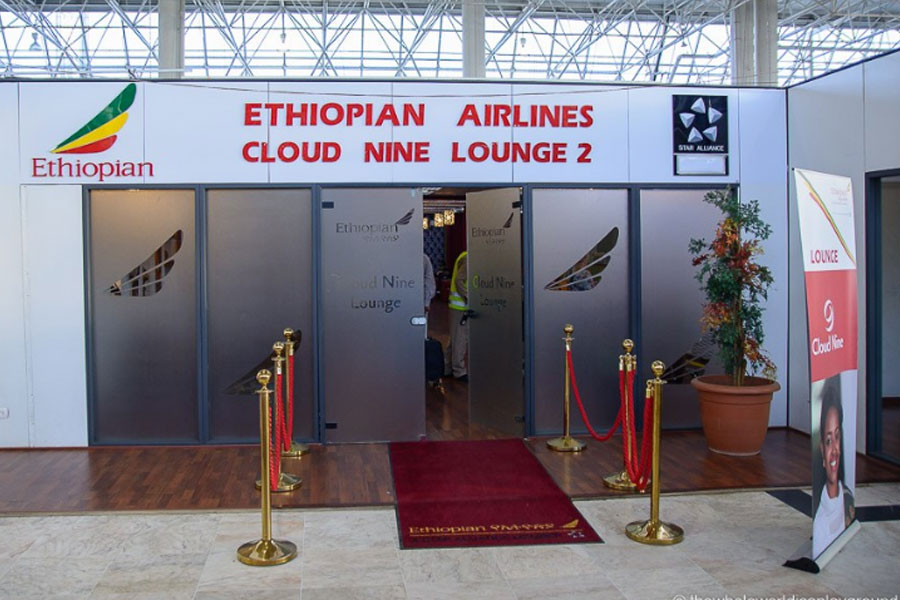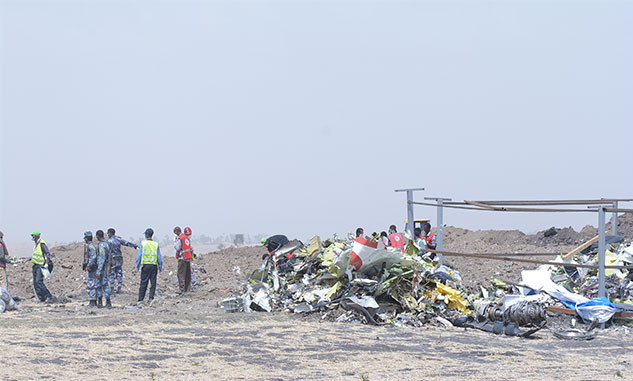
Editorial | Dec 28,2019
Apr 2 , 2022
By Yeshiwas Fentahun
An Authority whose presence all air operators can feel ensures continued healthy growth of the aviation sector. Now that the leadership at both Ethiopian Airlines and the Civil Aviation Authority have changed, the first building blocks can be laid down, writes Yeshiwas Fentahun (yeshiwasfz@yahoo.com), former chairperson at Ethiopian Airlines Group Basic Trade Union and former captain.
The Ethiopian Civil Aviation Authority has seen 13 years under its former Director-General, Wossenyeleh Hunegnaw (Col.). The state carrier, Ethiopian Airlines, has also registered significant growth unmatched by its African competitors in these same years. But the private aviation sector has seen little or no growth. The appointment of a new director-general for the Authority a few weeks ago not only presents opportunities for Ethiopian to better its efficiency, but could also offer some hope for the private sector.
On March 23, 2022, the announcement of the long time Group CEO of Ethiopian, Tewolde Gebremariam’s “early retirement” due to health reasons adds to this optimism concerning the aviation sector in Ethiopia.
The Authority was established almost two decades after Ethiopian made its maiden flight. No other controlling civil aviation authority is an exception to this rule. The Federal Aviation Authority (FAA) in the United States was formed almost half a decade after the first commercial flight in the United States but has managed to be a leading authority in matters of aviation.
The absence of growth of Ethiopia's aviation Authority results from two significant factors – a lack of understanding for its need and undue political pressure. Both are equally dangerous for Ethiopia and Ethiopian.
The capacity of the Authority measured in terms of different criteria such as technical capability, human power and financial resources has always been incompatible with what would qualify as sufficient for a country that boasts an airline as big as Ethiopian. As a result, the state carrier had been tasked with "self-oversight," which had its merits and pitfalls. Ethiopian has done a fairly reasonable job auditing itself for the last few decades. Still, there is a lot at stake in allowing it to continue to do the same and the future must hold much more both for Ethiopian and the private aviation sector.
Even among many informed citizens, the existence of the Authority is not a prevalent knowledge. This is equally reflected by a simple visit to its headquarters. It has one office in Addis Abeba, located near the airport. Its old offices, which are mostly staffed with retirees and ex-employees of Ethiopian and the Ethiopian Air Force, paint a picture revealing of the attention given to the Authority.
Despite overseeing the biggest state carrier in Africa and hundreds of flights departing from the capital every day, the value of the Authority is not often felt among the general public and many government officials. This lack of understanding of the need for it and the relationship that should exist between the Authority and Ethiopian could rightly be guessed to have emanated from the shadow created by the state carrier itself. Any mention of a word in aviation in any conversation, be it with a friend or a government official, reminds one of Ethiopian but never the Authority.
In the last decade, under the leadership of Tewolde, as CEO of Ethiopian and more recently as head of the Ethiopian Airlines Group, the Authority has been further pushed into a corner through undue political pressures, which were the results of the Group CEO’s ease of reach to the ruling elite. The Authority has not only been sidelined but “owned” by Ethiopian. Tewolde used everything at his disposal, be it formal lines of communication or his personal ties, to get things done – the airline’s operation was kept out of reach of the Authority's oversight for years.
The replacement of the higher management of the Authority, conditioned into submission for years, could not have come at a better time. Having new blood in the higher office of aviation's regulatory body will not only bring a new approach, but will present an opportunity for it to be the alpha male in the sector.
Tewolde’s role as group CEO did not only affect Ethiopian but also the private sector. His ties to policymakers has enabled him to get regulations that favoured Ethiopian passed, despite the impacts they may have on the country’s aviation sector. His attempts to introduce articles that would have been unfavourable to employees during the drafting of the current labour proclamation paints a good picture of the distance he used to go to have his way. On the surface, one may be tempted to think that he has done a great service to Ethiopian but the slow death that the private sector was forced into speaks otherwise.
Ethiopian Airlines Group has become the leader of African aviation, superseding its close competitors such as Kenya Airways, under the leadership of Tewolde. During the same period, the liberalised Kenyan aviation market has given birth to a private aviation industry that has grown big enough to dominate the whole of East Africa, including Ethiopia. By the end of 2021, the Kenyan Civil Aviation Authority had registered more than 1600 aircraft, and issued over 15,000 commercial pilot licenses and 100 aircraft operator certificates. Ethiopia's aviation Authority has registered less than 160 aircrafts, issued less than 10 aircraft operator certificates and less than 2,000 commercial pilot licenses since its formation. Until last year, Kenya Civil Aviation registered aeroplanes in partnership with local private operators that were busy exporting khat from Ethiopia to different places in Somali. Through policy instruments of the Authority, which favour the state carrier, Ethiopian has once again monopolised the khat export business as well.
There are many similar instances where the Authority’s policy instruments were used to clear the forest in the interest of Ethiopian despite the damage it may have on the sector as a whole. Instead of mediating the operating rules, the Authority has been acting as Ethiopian's protector and guardian angel.
Now that Tewolde is gone, a clear divergence from the past is expected from Ethiopian’s management. At a minimum, it should be willing to allow the private sector to feast on its leftovers and stop putting undue pressure on the Authority to steer everything in its favour. The sense of animosity between the giant Ethiopian and the tiny private operators should be addressed. Even better, Ethiopian should partner with local operators in ground handling, regional cargo operations and pilot training.
The assignment of former Ethiopian CEO, Girma Wake, as board chairperson of Ethiopian will hopefully steer the company in the right direction, assuming no space for political meddling is in store. A functioning board with real oversight will be a clear departure from past experiences where board members had little to no role in major decision making.
Current political changes should be able to create a healthy structure that is consistent with the proclamation that gave birth to the Authority. A recognition that the director-general of the Authority has the ultimate responsibility in national civil aviation matters should be a fact that everyone, including the management of Ethiopian, is able to swallow. With this realisation, the new head of the regulatory body, Getachew Mengiste, should take over the rubble left behind by decades of government self-repression. Control does not necessarily stifle growth but rather presents an opportunity for improved efficiency. Ethiopian must realign itself with a possible new reality of a leashed future. An Authority whose presence can be felt by all air operators ensures continued healthy growth of the aviation sector.
Building a strong institution worthy of its name may take years but the first building blocks shall be placed now. Sufficient resources should be funnelled to the Authority but income generation should be considered as well. Thousands of aviation license holders should be made to pay license renewal fees proportional to the income they enjoy through the license issued by the Authority. Existing staff need to be trained, but other professionals should also be incentivised to work for the Authority through special incentives. By hook or crook, the Authority must hold its place as a regulator and this must be seen as a national interest issue. The future of an airline as big and worthy as Ethiopian cannot and shall not be left to itself.
PUBLISHED ON
Apr 02,2022 [ VOL
23 , NO
1144]


Editorial | Dec 28,2019

Radar | Nov 07,2020

Radar | Dec 10,2018

Fortune News | Apr 26,2019

Radar | Jul 18,2021

Sunday with Eden | Mar 09,2019

Fortune News | Nov 03,2024

Verbatim | Jan 12,2019

Fortune News | Jul 06,2019

Radar | Jan 29,2022

My Opinion | 131981 Views | Aug 14,2021

My Opinion | 128369 Views | Aug 21,2021

My Opinion | 126307 Views | Sep 10,2021

My Opinion | 123925 Views | Aug 07,2021

Dec 22 , 2024 . By TIZITA SHEWAFERAW
Charged with transforming colossal state-owned enterprises into modern and competitiv...

Aug 18 , 2024 . By AKSAH ITALO
Although predictable Yonas Zerihun's job in the ride-hailing service is not immune to...

Jul 28 , 2024 . By TIZITA SHEWAFERAW
Unhabitual, perhaps too many, Samuel Gebreyohannes, 38, used to occasionally enjoy a couple of beers at breakfast. However, he recently swit...

Jul 13 , 2024 . By AKSAH ITALO
Investors who rely on tractors, trucks, and field vehicles for commuting, transporting commodities, and f...

Jul 5 , 2025
Six years ago, Ethiopia was the darling of international liberal commentators. A year...

Jun 28 , 2025
Meseret Damtie, the assertive auditor general, has never been shy about naming names...

Jun 21 , 2025
A well-worn adage says, “Budget is not destiny, but it is direction.” Examining t...

Jun 14 , 2025
Yet again, the Horn of Africa is bracing for trouble. A region already frayed by wars...

Jul 6 , 2025 . By BEZAWIT HULUAGER
The federal legislature gave Prime Minister Abiy Ahmed (PhD) what he wanted: a 1.9 tr...

Jul 6 , 2025 . By YITBAREK GETACHEW
In a city rising skyward at breakneck speed, a reckoning has arrived. Authorities in...

Jul 6 , 2025 . By NAHOM AYELE
A landmark directive from the Ministry of Finance signals a paradigm shift in the cou...

Jul 6 , 2025 . By NAHOM AYELE
Awash Bank has announced plans to establish a dedicated investment banking subsidiary...